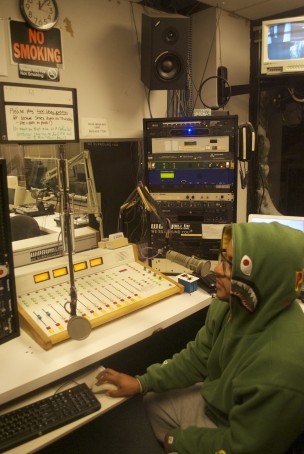
Every year, WESU Middletown undergoes a process of grooming the next generation of DJs for one of the country’s oldest college radio stations. Aspiring DJs must participate in five training seminars over the course of a semester in the hopes of eventually having their own show on WESU.
The WESU training course has been going on for the past three years and is led by the station’s Public Affairs Director David Bauer, who has been working with the station for six. DJ and member of the WESU Board of Directors Adam Wechsler ’13, who has been working with the station for about a year and whom some may know for his biweekly show “Today’s Yesterday Tomorrow,” also leads sessions. The classes are split into three different groups, each consisting of 20 students and volunteers (many of whom are otherwise unaffiliated with the University) who meet for an hour a week to be taken through the ins and outs of the station’s system.
At the start of the course, all of the trainees receive the training manual, which is essentially the Bible for all the important standards, regulations, tips, and tricks to make it in radio. Working out of this manual, the sessions are divided into two parts.
First, potential DJs must learn the rules and regulations. Some of the guidelines covered could almost go without saying: no inappropriate content (volatile comments, inappropriate references, f-bombs, what have you) before 10 p.m., and no obscene content whatsoever. But then there are some trickier rules trainees need to consider, such as one prohibiting DJs from announcing exclusive Wesleyan events on the air, since WESU broadcasts to a community that extends beyond campus. DJs are also solely accountable for making sure that there is no dead air.
The training culminates with a test at the end of the seminar, which determines whether or not trainees can become staff members and sign up to have their own shows.
During the second component of the training, prospective DJs get a glimpse into the actual process of creating a show. On Sunday, Nov. 4, trainees were given a tour of the recording studio and got to see various DJs at work.
In addition to being able to play music in any medium, from vinyl to cassette tapes to mp3 files, DJs can also broadcast pre-recorded material and host live musicians within the studio. Also, thanks to a seven-second delay between what is recorded and what is broadcast, DJs can press a button to “dump” content that is inappropriate for broadcast before it actually reaches listeners.
WESU training also has an internship component, which requires trainees to sit in on and help out with existing shows. Anyone listening carefully to the station during the past week might have noticed some unfamiliar, slightly confused and cautious voices chiming in every now and then. Last week, Ethan Hill ’16 had his first hands-on experience on the show “Bridging The Gap.”
“It was interesting and fairly straightforward,” Ethan wrote in an email to The Argus. “It was mostly just hands-on operating of the board. I’ll admit, reading the on-air profanity warning was kind of humorous.”
Trainees also need to accumulate four hours of volunteer service to the station, which can be completed in a number of ways—by answering phones during the station’s pledge drive, for instance.
Within the training group, there is a wide variety of future show ideas being thrown around—from Hill’s idea of a garage rock show, which would trace underground rock from the ’40s and ’50s to the present, to the plan that Mads O’Brien ’16 has for a spoken-word and poetry show.
However, despite all the excitement over the fame and glory that becoming a college DJ would entail, there is reason to be hesitant. WESU currently has over 110 staff members, which is slightly problematic when considering the onslaught of 60 new prospective DJs.
“Usually we’d have an attrition rate over 50 percent, but this year we’ve only lost a couple of people,” Bauer said. “I’m impressed and a little bit scared at the same time.”
Of course, that’s not to say that all of the trainees’ work will be for naught. Even though half of the current DJs are volunteers who are not affiliated with the school, another large chunk consists of students who are approaching graduation.
“While I’m not sure whether everyone’s going to have a show next semester, odds are good for next year,” Wechsler said.


Leave a Reply